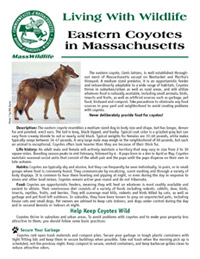With the presence of coyotes, fishers and more wild turkeys than when the Pilgrims were here, Cape Cod is arguably more wild then it has been in hundreds of years. As the Cape gets more “wild”, there is more to be concerned about regarding local wildlife and local residents living together.
Children
Talk to your children about wild animals. Make sure they know that the wild dog they see is not a friendly pet. Let them know that the coyotes are more afraid of them than they should be of coyotes.
 Tell them not to run if they see a coyote. Running may trigger the animals prey instinct and get your child in trouble. Tell them instead to stand up tall and raise their arms above their heads and wave them back and forth. This will make the child appear to be larger than they actually are to the coyote. Tell them also to be loud. This should not be a problem for most children and should make the coyote even more afraid of them.
Tell them not to run if they see a coyote. Running may trigger the animals prey instinct and get your child in trouble. Tell them instead to stand up tall and raise their arms above their heads and wave them back and forth. This will make the child appear to be larger than they actually are to the coyote. Tell them also to be loud. This should not be a problem for most children and should make the coyote even more afraid of them.
While coyote attacks for the most part are rare, the more serious coyote attacks on humans which resulted in serious injury or death have occurred when the victim ran from the coyotes which likely triggered their prey instinct.
Pets
Don’t feed your animals outside. The regular presence of pet food in your yard or on your porch will attract wild animals. This could lead to a confrontation which could leave your pet dead or severely injured. Confrontations could also expose your pet to diseases that may be carried and transmitted by these animals.
Distemper and canine hepatitis are the most common diseases occurring in coyotes. Rabies and tularemia also occur and may be transmitted to humans and other animals. Coyotes often carry mites (mange), ticks, fleas, worms and flukes.
Dogs
Most coyote and dog incidents occur during late winter when coyotes are mating and in late spring/early summer when coyotes are raising and protecting their young pups.
Cats
If you love your cats, don’t de-claw them, your cat’s best defense against canine predators is it’s ability to climb. If your cat is not a climber, keep it inside the house.
Lyme Disease
Just about everyone on Cape Cod knows someone that has contracted lyme disease. Lyme disease is a serious concern for anyone that spends time in the outdoors these days.
All furbearers in Massachusetts carry deer ticks.
The exponential increase in deer numbers throughout the United States from an estimated 500,000 in 1900 to 30,000,000 today has greatly increased the number of deer ticks throughout the country. Increased outdoor recreation, extended forest cover (especially in the Northeast), reduced hunting in some areas and continued suburban sprawl are some of the factors involved in the rise in reported cases of Lyme disease and other tick-borne infections in humans throughout the United States. — American Lyme Disease Foundation
Additional info: MassWildlife “Living with Wildlife”

Saw a gray wolf last night at midnight in Welfleet by bike trail. Was checking out my barbecue which is at mile marker 22. Had gray fur – looked about 50 lbs. if it was a “coywolf” I would recommend changing name to “wolf-ote” because it looked more wolf than coyote to me!
At approximately 11:45 am spotted a “gray wolf” in our back yard. By him or herself just staring at the house. Previously just outside playing with our dog. He looked to be the same size as our one year old german Shepard. We live at 171 Old County Road Sandwich Ma.